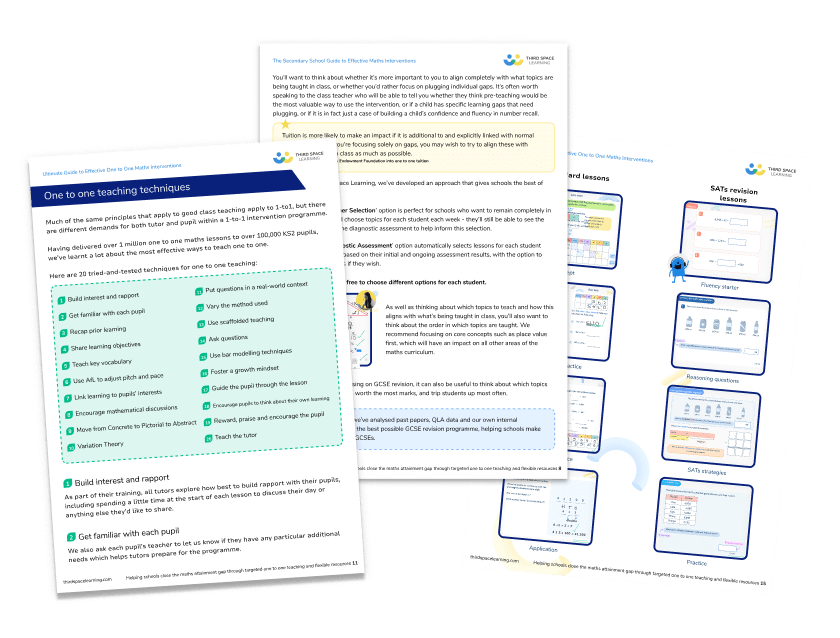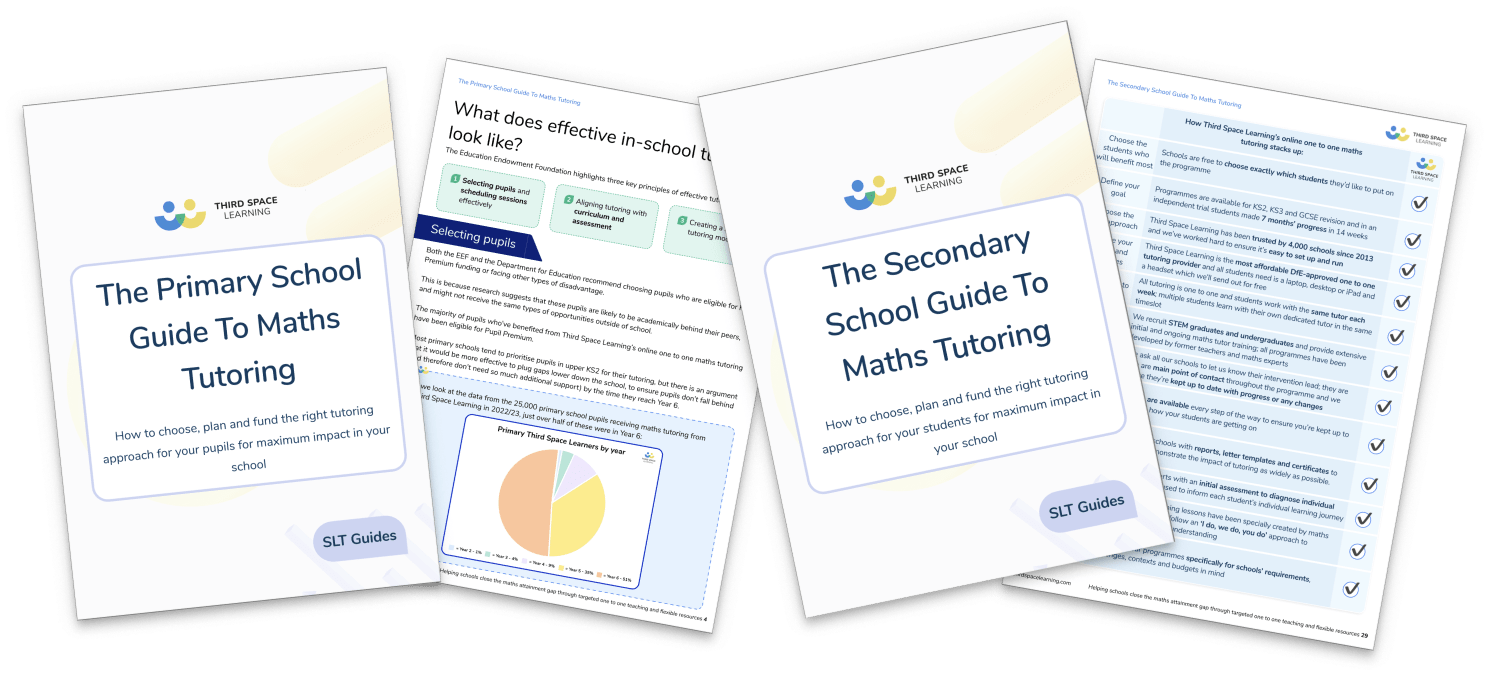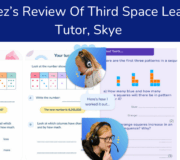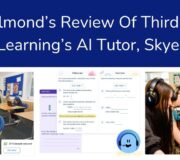How And Why Schools Are Continuing Tutoring After The End Of NTP Funding
The 2023/24 academic year marked the fourth and final year of National Tutoring Programme funding (NTP funding) for schools. This was a government initiative launched in 2020 to help schools mitigate the impact of the pandemic.
We supported 4,000+ schools through The National Tutoring Programme, which went through many iterations. But in essence, it provided schools with additional tuition funding to provide one-to-one and small group tutoring to the pupils in their schools who felt they needed it most.
In this guide, we outline why so many of our schools are continuing to provide tutoring after the NTP, and how they’re funding it.
What was NTP funding?
NTP funding is a ring-fenced funding allocation the government provided to state-funded schools to help pay for school-led tutoring or external tutoring organisations to improve academic outcomes after the pandemic.
The NTP grant helped primary and secondary schools provide targeted academic support through approved tuition partners to the learners who needed it most.
How much was the NTP funding?
Funding allocations are based on the number of eligible pupil premium pupils (PPG) each school has. National Tutoring Programme funding for the 2023/24 academic year. Mainstream schools received a minimum of £67.50 per PPG and non-mainstream schools received a minimum of £176.25. Local authority maintained special schools were eligible for more.
In the 2023/24 academic year, schools could use their NTP funding to cover up to 50% of the cost of high quality tutoring, with the remaining 50% coming from their school budget.
However, from September 2024, schools will not receive any additional ring-fenced tutoring funding, but the Department for Education is still strongly encouraging schools to continue to offer tutoring this academic year. Meaning, from this academic year, schools are expected to cover 100% of the costs of tuition themselves.
Any unspent funding from the 2023/24 academic year was reclaimed by the Education and Skills Funding Agency.
Tutoring is an effective and well-evidenced targeted approach to increase the attainment of disadvantaged pupils. Tutoring should supplement and be linked explicitly to high-quality classroom teaching. We strongly encourage schools to continue to fund tutoring using pupil premium from September 2024, following the final year of the NTP.
Department for Education – Using Pupil Premium: Guidance for School Leaders – February 2024
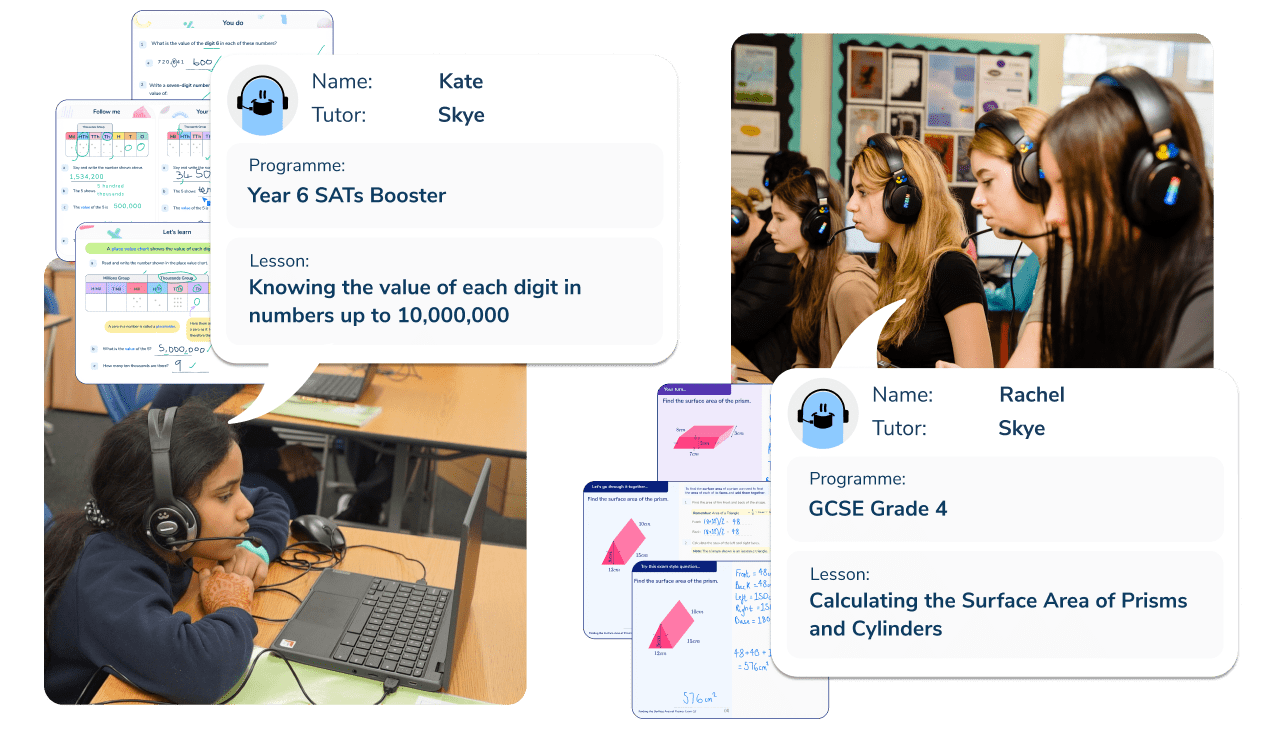
Meet Skye, the voice-based AI tutor making maths success possible for every student.
Built by teachers and maths experts, Skye uses the same pedagogy, curriculum and lesson structure as our traditional tutoring.
But, with more flexibility and a lower cost, schools can scale online maths tutoring to support every student who needs it.
Watch Skye in actionWhy schools are continuing with tuition partners after the NTP grant finished
Here at Third Space Learning, we’ve been helping to support pupils in the UK with personalised online one to one maths tutoring in primary and secondary schools since 2013, long before the NTP or Recovery Premium existed.
And, while we certainly saw an increase in demand while funding from the NTP was available, a significant number of our schools are choosing to continue beyond the end of the NTP.
Understandably, we’re also speaking to schools who would love to continue with the tutoring but aren’t sure how best to fund it with the NTP ending.
We appreciate how tough this time is for schools, and how many difficult decisions are being made to find tutoring funding within already stretched budgets.
But, here’s why so many schools are continuing to provide tuition through an experienced tuition partner after the National Tutoring Programme has ceased to continue.
The Ultimate Guide to Maths Tutoring
How to choose, plan and fund the right tutoring approach for your students for maximum impact in your school.
Download Free Now!1. One to one tutoring works
According to the Education Endowment Foundation (EEF), tutoring is one of the best evidenced interventions to support disadvantaged pupils’ attainment.
Many schools are choosing to continue with tutoring – funded by Pupil Premium – to ensure these pupils receive the opportunities they need to catch up to their peers.
For many of our schools, the choice to continue is down to the efficiency of providing personalised one to one maths support for multiple pupils simultaneously:
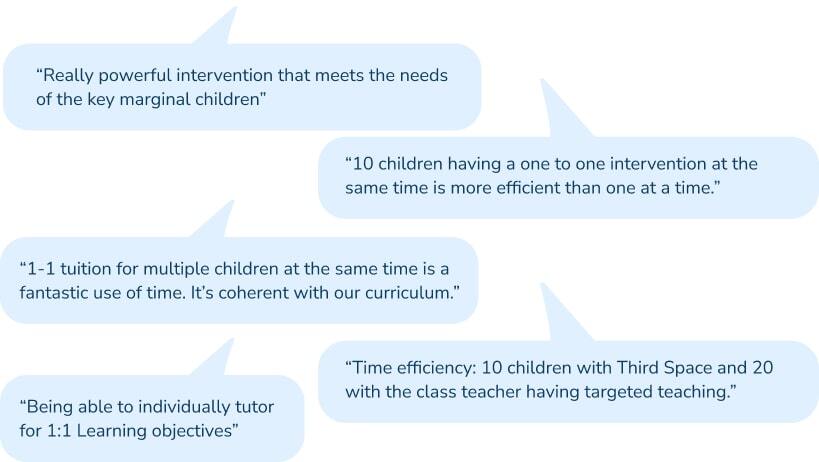
According to our recent survey of Year 6 teachers and primary SLT, most schools opted for small group tutoring delivered by school staff this year. But, schools that provided one to one tutoring reported a bigger impact.
97% of teachers using Third Space Learning’s one to one maths tutoring programmes for their Year 6 pupils said the tutoring has been effective at preparing them for SATs.
The EEF agrees; reporting one to one tutoring as ‘very effective’ at improving pupil outcomes, with larger positive effects than small group tutoring.
But in this post-NTP world isn’t one to one tutoring too expensive for schools?
Not necessarily.
While the average cost of one to one tutoring from NTP providers ranges from £51 per pupil per session for face to face tutoring to £46 per pupil for online, there’s a huge range in prices.
For example, support from Third Space Learning – the most affordable one to one tutoring provider – is 56% cheaper than the average and £10 cheaper per pupil per session than the next cheapest provider.

By taking tutoring online and developing an AI maths tutor, we’ve been able to provide schools with personalised one to one tutoring for the price other providers charge for group sessions – long before and after the NTP.
And, given the increased positive effects on their pupils’ progress, one to one tutoring is a cost-effective option. Especially if they can deliver tutoring through a tuition partner as affordable as Third Space Learning.
“Our pupils look forward to learning with Skye. Their teachers have said that they could see that the children were happier in certain topics and that they felt a little bit more sure of themselves. We can extend it to more pupils because it’s significantly cheaper than before and we have unlimited sessions across Year 4-6.”
Lucia Romeu, Assistant Headteacher,
Danegrove Primary School
2. Tutoring frees up staff time
When schools can find a cost-effective tuition partner within their budget, the impact goes beyond those receiving support.
We recently heard from a Deputy Head about how Third Space Learning’s tutoring helped increase efficiency in class teachers:
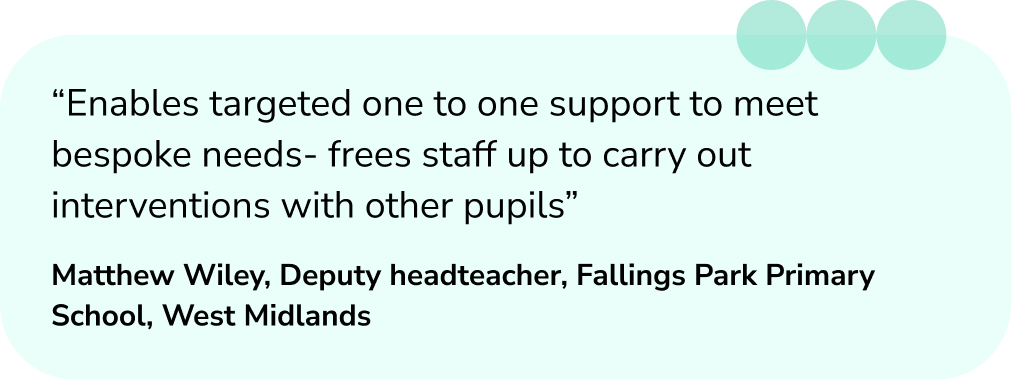
Using an external tuition provider to provide support and personalised learning opportunities helps teachers progress through the curriculum effectively. Providing an experienced AI tutor to support those who need to revisit concepts and close gaps means staff can focus on the rest of the class.
According to a recent survey, teachers who used Third Space Learning tutoring:
- Found the 2024 maths SATs papers easier than those who hadn’t
- Thought their pupils were more prepared for the maths SATs 2024 papers
- Felt more confident that the maths SATs 2024 papers will provide a fair understanding of their pupils’ understanding of maths
- Were more likely to cover all of the curriculum content before moving on to revision
If you’re using an external provider, look for one that offers additional services that help reduce teacher workload.
For example, schools using Third Space Learning’s tutoring programmes get access to:
- Diagnostic and post-programme assessments
- Tutoring session reports
- On-demand reports showing progress over time
- Full library of ready-to-use maths resources and CPD
3. Subject specialist tutors
It’s no secret that teacher recruitment and retention is a big challenge in school. In fact, the National Foundation for Educational Research (NFER) recently declared it had reached a “critical state”.
Maths is among the most affected subjects, with the BBC recently reporting how, in some schools, PE teachers were retraining in maths to fill school gaps.
According to the NFER’s annual report ‘Teacher Labour Market in England’ for 2024, The government only reached 63% of its target number for new maths teacher trainees this year.
In the DfE’s guidance, they highlight how ‘tutoring is more likely to be impactful when delivered by a subject specialist able to deploy teaching strategies effectively‘, and how remote (online) tutoring can help to open up a wider pool of tutors to be able to bring this expertise into school.
For many schools, tutoring is a really effective way to bring in subject specialists where they don’t have access themselves.
Third Space Learning’s maths specialist AI tutor
Third Space Learning’s AI tutor, Skye, is trained by maths and pedagogy specialists, keeping humans in the AI loop. Our teachers and specialists use the evidence-based research we’ve gained from delivering over 2 million hours of tutoring to prompt Skye for effective spoken AI tutoring.
Based on research and teacher and pupil feedback, Skye receives continual prompt updates to deliver the best AI maths tutoring experience to multiple pupils simultaneously.
Find out more on why schools are making the move from traditional to spoken AI tutoring and the most popular use cases for AI tutoring in the schools we work with.
“We used AI tutor Skye this year. 93% of our Third Space Learning pupils reached the expected level. One child, who had been struggling with maths, attained at greater depth (scaled score 110).”
Deb Harris, Assistant Headteacher and Maths Lead,
Wormley CofE Primary School
How to fund tutoring after the National tutoring programme
Pupil Premium funding
Now that funding from the NTP has finished, many mainstream schools are using Pupil Premium funding.
In fact, the DfE ‘strongly encourages’ schools to continue to fund tutoring using Pupil Premium from September 2024. For the 2024/25 academic year, Pupil Premium is increasing by 1.7%.
Who is eligible for Pupil Premium?
State funded primary and secondary schools receive Pupil Premium funding to improve outcomes for disadvantaged pupils.
Pupil Premium can be used to:
- Support teaching;
- Tackle non-academic barriers such as social and emotional well-being and behaviour;
- Target academic support though initiatives such as tutoring.
This is how most schools funded Third Space Learning between our launch in 2013 and the start of the NTP.
An added benefit of Third Space Learning is that every school staff member receives access to our full library of resources and CPD at no additional cost. This means they can target their spending on specific pupils while still helping to raise attainment across the school.

Discounts can make a difference
If you’re part of a Multi Academy Trust or school cluster, you may be able to arrange a discount with your preferred tutoring provider if multiple schools sign up.
At Third Space Learning, 46% of our primary schools and 76% of our secondary schools are part of MATs, with an average of 30% of academies per trust signed up. MAT discounts are available for multi-school sign-ups.
We also offer a 13% discount for schools who sign up for 6-terms and a 21% discount for 9-term bookings. Bookings of 20+ pupils are also eligible for discounts, the more support schools provide, the more they save.
It’s always worth speaking to other schools in your local authority or MAT to see if and how they’re implementing tutoring next year, as their provider may well run a referral scheme.
If you are referred by or refer a school, we offer a price reduction for both schools – it’s a win-win!
If you’re looking to sign up for Third Space Learning, we can put you in touch with a school in your local area to hear the impact of tutoring directly from them.
Prioritising pupils is more important than ever
Without NTP funding, schools need to ensure they carefully prioritise those receiving tutoring.
It’s essential schools prioritise not only which pupils are most in need of support from trained and experienced tutors, but also those in which they’re likely to see the most impact.
We asked some of our primary schools which pupils they feel Third Space Learning’s one to one maths tutoring works best for:
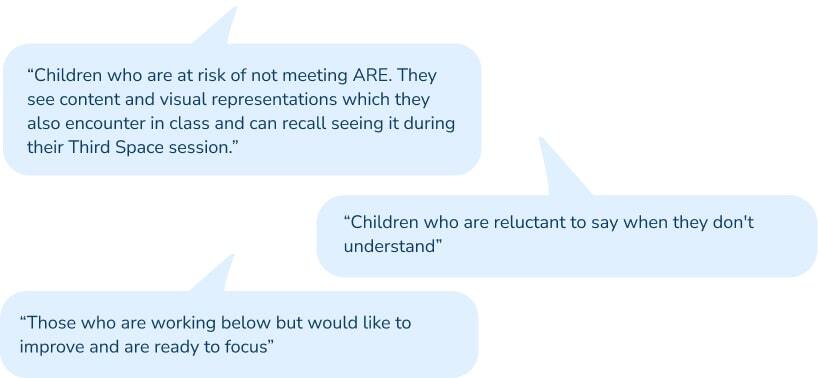
Reporting on tutoring provision
The end of NTP funding doesn’t mean the end of schools reporting on how they’re implementing tutoring.
In the DfE’s recent publication ‘Tutoring: guidance for education settings’, they state that they will continue to collect tutoring data from schools, including the number of pupils who have received tutoring.
Ofsted will also continue to consider tutoring as part of their inspections:
- Ofsted will review and consider information about the use of tutoring in your school among a myriad of other relevant data;
- Ofsted will evaluate learning from tutoring as part of the wider curriculum;
- Ofsted will consider how tutoring supports the aims of the school curriculum;
- Ofsted will integrate the use of tutors into the evaluation of the quality of education and the quality of leadership and management.
Looking to implement cost-effective one to one tutoring for your pupils in 2024/25?
Let’s chat about how we can close gaps, boost confidence and accelerate progress after the NTP ends.
You can learn more about how it works here or request a personalised quote for your school here.
Already signed up to Third Space Learning tutoring and want to continue next year? Let us know here.
DO YOU HAVE STUDENTS WHO NEED MORE SUPPORT IN MATHS?
Skye – our AI maths tutor built by teachers – gives students personalised one-to-one lessons that address learning gaps and build confidence.
Since 2013 we’ve taught over 2 million hours of maths lessons to more than 170,000 students to help them become fluent, able mathematicians.
Explore our AI maths tutoring or find out about maths tuition for your school.
